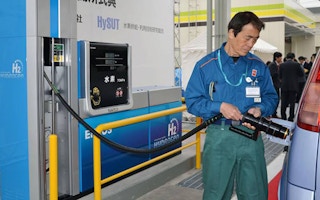Tokyo plans to spend 45.2 billion yen ($385 million) on fuel-cell vehicle subsidies and hydrogen stations for the 2020 Olympics as part of Prime Minister Shinzo Abe’s plan to reduce Japan’s reliance on nuclear power.
Japan’s capital will build 35 stations to fuel hydrogen-based FCVs and is in negotiations with Toyota Motor Corp and Honda Motor Co to put 6,000 hydrogen cars on its roads by 2020, said Makoto Fujimoto, who heads the planning team at the metropolitan government’s energy department.
Japan is putting resources into hydrogen power after suffering its worst nuclear disaster since World War II in March 2011, when an earthquake and tsunami damaged the Fukushima Daiichi power plant. Spending on hydrogen infrastructure comes as Tokyo’s government is under pressure to rein in costs as it prepares to host the quadrennial games.
“The Olympics are a good opportunity to showcase new technologies,” said Hiroshi Takahashi, a research fellow at Fujitsu Research Institute. “It’s also a significant chance to attract new investment and update the city’s transportation system to make it fuel-cell friendly.”
Last week, Toyota delivered its first Mirai fuel-cell model to Abe. After a short test drive at his official residence, Abe declared it was “very comfortable” and said he wants “all ministries and agencies to have” the Mirai.
“It’s time to introduce a hydrogen era,” he told reporters on Jan. 15.
“
It’s time to introduce a hydrogen era
Hiroshi Takahashi, research fellow at Fujitsu Research Institute
‘Hydrogen society’
The national government is planning hydrogen distribution facilities as it supports Toyota, which pioneered hybrid vehicles, to help popularise what the carmaker sees as the next generation of auto technology. Abe has said Japan intends to create a “hydrogen society,” with cells powered by the element also powering homes and office buildings.
Japan’s fuel-cell subsidies are bigger than the incentives that China, the US and Europe are offering for electric-vehicle buyers. They are also more than triple the 950,000 yen of incentives Japan offers buyers of Mitsubishi Motors Corp.’s all-electric i-MiEV.
The country is paying 10 billion yen a day to buy natural gas after the reactor meltdown forced the shutdown of all of its nuclear plants, Fujimoto said.
Under the Tokyo Metropolitan Government’s plan, the city is targeting to have 100,000 hydrogen passenger vehicles, 100 hydrogen buses and 80 refueling stations by 2025. Buyers of fuel-cell vehicles in Tokyo will be entitled to about 1 million yen of subsidies, on top of the 2 million yen provided by the central government, he said.
Government subsidies
More than 80 per cent of the costs of building hydrogen stations will be subsidised by the Tokyo government, capping the costs for operators at 100 million yen, or about the same as building a gasoline station, according to Fujimoto. The government may cover the costs entirely for small-business owners, he said.
Toyota President Akio Toyoda told reporters last week that the automaker was considering increasing production after receiving about 1,500 Mirai orders — 60 per cent of which are from government offices and corporate fleets — in the first month, compared with its target of 400 by the end of 2015.
Fuel cells are considered environmentally friendly because they convert hydrogen to electricity, leaving water vapor as a by-product.










